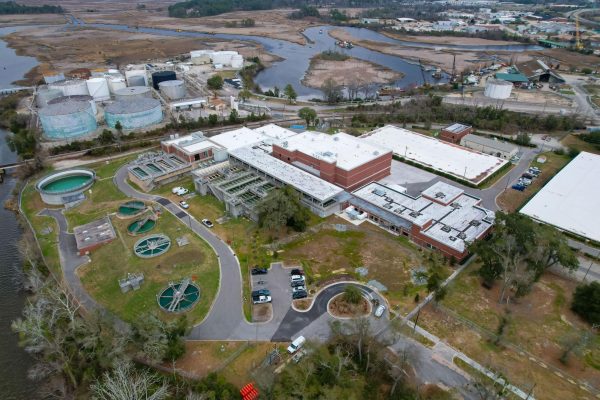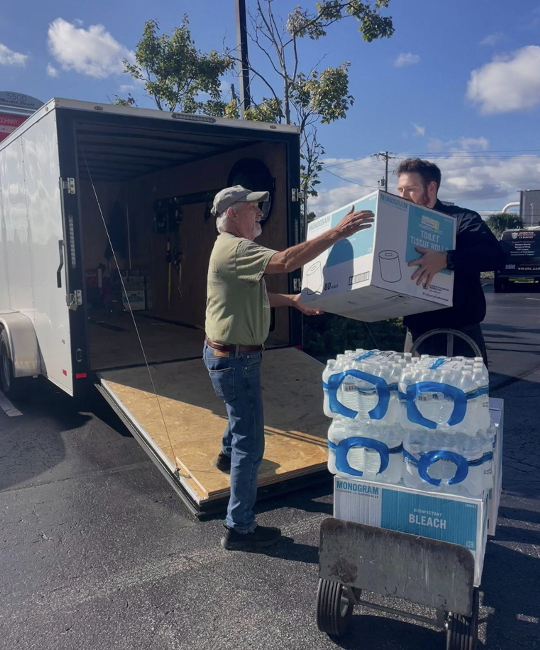
In late Oct. 2023, the Sweeney Water Treatment Plant in New Hanover County was awarded the “Gold Star” honor by the N.C. Department of Environmental Quality (NCDEQ) Water Resources Division. The water treatment plant services a sizable portion of New Hanover County, including most of Wilmington and UNCW. The plant was given this award after receiving the NC Area Wide Optimization Award for 10 consecutive years, demonstrating outstanding turbidity removal. Turbidity is the haziness or cloudiness of water, resulting from small individual particles invisible to the human eye. Fourteen other plants in the state received the award, including the Cary/Apex Water Treatment Plant and the D.E. Benton and E.M. Johnson Water Treatment Plants in Raleigh.
Cammie Bellamy, Public Information Officer for CFPUA, was asked by The Seahawk about how the Sweeney Plant achieves these low turbidity levels.
“CFPUA’s Sweeney Water Treatment Plant puts raw water through multiple state-of-the-art treatment steps to produce high-quality drinking water. Turbidity is removed from water during the earliest treatment stages, especially during settling and clarifying in the plant’s Superpulsators. Turbidity is further reduced during ozonation and by the plant’s biological filters.”
The award did not consider other contaminants – including the PFAS, also known as per– and polyfluoroalkyl substances – detected in Wilmington’s water supply.
Despite the lack of testing for PFAS, the award highlights a new installation at the plant; Granular Activated Carbon (GAC) filters, aimed at removing the PFAS contamination of the city’s water supply uncovered in 2017 by Star News. While research is still ongoing, various studies have pointed to PFAS as having adverse health effects, including low birth weights, changes in the liver, weakened immune system and an increased risk of several types of cancer, including kidney and testicular. The exact impact of PFAS on health is unclear.
The GAC filters installed at the Sweeney Plant were initially successful at removing PFAS by reducing the chemical to nearly undetectable levels. However, breakthrough compounds are still possible, such as the Oct. 2022 discovery of PFPrA (perfluoropropionic acid), which was detected at the Sweeney Plant – with the highest level detected as 35 parts per trillion, with an average of 15-25 ppt in drinking water.
The “low-confidence reference dose” for PFPrA established by the Environmental Protection Agency (EPA) is equivalent to a daily exposure of 2,100 parts per trillion (ppt) for a future health advisory. A reference dose is the amount perceived by the EPA to be safe for human consumption, not likely to cause negative health outcomes throughout one’s life. The health advisory for Gen X is 10 ppt.

Bellamy was also asked whether CFPUA was filtering PFPrA to a safe level.
“No state or federal regulatory agency has established a Maximum Contaminant Level (MCL) or other drinking water regulation for PFPrA,” Bellamy said. “Our latest sampling of drinking water treated at the Sweeney Plant, completed on Nov. 14, detected PFPrA at 14.4 parts per trillion (ppt).”
This number is lower than the Oct. above 2022 samples, averaging 15-25 ppt.
The cost of the filter, as well as who’s footing the bill, has inspired litigation. CFPUA is seeking the $43 million cost for installation of the filters from Chemours. The CFPUA has also launched further litigation against DuPont, the parent company of Chemours, by seeking to recover damages of $238 million- the purported cost incurred by the utility company since DuPont’s operation of the Fayetteville Works Plant.
Fayetteville Works, sitting upstream the Cape Fear River, produced PFAS from the early 1980s until 2015. CFPUA states that DuPont purposefully stripped away assets to avoid liability for the intentional pollution of the Cape Fear Region with PFAS. Experts appointed by the United Nations Human Rights Council recently referred to the Fayetteville Works Plant as an “alleged human rights violation.”
With recent rate increases for CFPUA customers, Bellamy said the reason was due to the implementation of GAC filters.
“Yes – the average CFPUA customer’s combined water and sewer bill has increased by $5.88/month or $70.56/year due to costs associated with constructing and operating the new GAC facility,” Bellamy said. “This increase applies equally to all CFPUA customers; CFPUA does not charge different rates to customers in different parts of our service area.”
In addition, she commented regarding the litigation to recover the costs of installation.
“It is CFPUA’s position that the polluter responsible for PFAS contamination in the Cape Fear River – not CFPUA’s customers – should pay for costs associated with addressing that pollution,” Bellamy said. “In 2017, we filed a lawsuit against Chemours and DuPont in federal district court for the Eastern District of North Carolina. So far, neither company has stepped up to their responsibility to cover costs and damages associated with their PFAS contamination. Until that occurs, we will proceed with the lawsuit.”



















